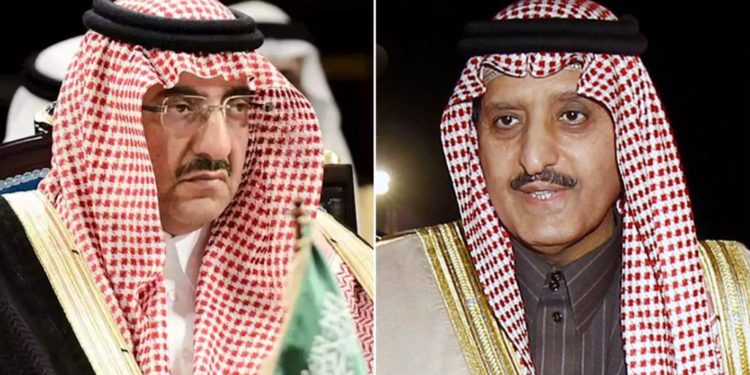
Since the outbreak of the new Coronavirus in the Kingdom, Crown Prince Mohammed bin Salman has issued arrest warrants against at least ten princes from the Saud House family, amid global preoccupation with the pandemic.
Members of the royal family, which includes about 15,000 members worldwide, have not been immune from the hand of bin Salman, who perpetuates repression and persecution for anyone who opposes him.
The Kingdom has witnessed several waves of detention in recent years, the last of which was in March, when about a dozen prominent family members were arrested.
However, it was the arrest of Prince Salman bin Abdulaziz, 37, and his father in 2018 that drew international attention and then sparked a major campaign for their release.
The reasons for the arrest of the prince, who tended to do charity campaigns and donated some of his wealth to social causes in underdeveloped countries, are unknown.
He is also not known to have political interests or aspirations, but he apparently met California Democrat Adam Schiff during the 2016 presidential campaign.
And Schiff, who heads the Intelligence Committee in the US House of Representatives, is a staunch critic of Donald Trump, whom Muhammad bin Salman knows closely.
The Sonoran Police Group (SPG), a commercial pressure firm, signed a contract worth $2 million (1.8 million euros) with a colleague of Prince Salman bin Abdulaziz residing in Paris to defend his release.
The move is supported by the governments of the United States, Britain and the European Union.
In February, France Presse Agency reported that a delegation of the European Parliament visited the Kingdom at the time and called on the authorities to release the prince and other detained royal family members.
The kingdom is currently going through a difficult economic and political crisis, exacerbated by the low oil prices and the COVID-19 pandemic. The Kingdom was also criticized for its interference in Yemen and the assassination of journalist Jamal Khashoggi, on the orders of the Crown Prince.
The Indian Express considered that the Saudi princes believe that the time is now more willing to negotiate the release of Prince Salman bin Abdulaziz than they have been until now.
In April, for example, the kingdom introduced some progressive criminal justice reforms, such as abolishing the death penalty for minors and flogging.
The arrests made since March included Prince Ahmed, brother of the ruling king, and Muhammad bin Nayef who was ousted as crown prince in 2017 and charged with treason.
In March, two other arrests raised eyebrows. The detainees are the children of former Interior Minister Saad Al-Jabri, counselor of Nayef. No children have been seen since their arrest, and it is widely believed that they are being used as a lever to force Al-Jabri to return to the Kingdom from Canada, where he has been in exile since 2017.
Prince Faisal bin Abdullah Al Saud, son of the late King Abdullah, has not been heard from since his arrest in late March. Faisal was arrested during the wave of arrests in 2017, but was released shortly thereafter. However, he was prevented from leaving the country.
According to Human Rights Watch, the Kingdom’s political system was criticized, albeit not in public, and security forces detained him in his family compound north of Riyadh on March 27.
“Despite the waves of criticism, the unlawful behavior of the Saudi authorities during the rule of Muhammad bin Salman de facto continues unabated,” said Michael Page, deputy director of the Middle East and North Africa division at Human Rights Watch.
“We must now add Prince Faisal to hundreds of detainees in Saudi Arabia without a clear legal basis,” Page added.
Speaking to the DW, Ali Adobeisi, director of the Berlin-based Saudi European Organization for Human Rights (ESOHR), said that the crown prince would now have to strengthen his authority against the candidates for the position of king.
Bin Salman carried out the largest campaign of arrests of more than 381 personalities of the royal family and famous economic figures in the Kingdom, and arrested the suspects at the Ritz-Carlton Hotel in the Saudi capital, Riyadh, from which all inmates were evacuated and the reservation services were stopped and all telephone lines were cut off.
The Kingdom announced that the sums confiscated from the princes and businessmen held at the Ritz-Carlton Hotel at that time, exceeded the 400 billion riyals barrier, was transferred from banks to the Saudi Arabian Monetary Agency (the Central Bank of Saudi Arabia), but it did not appear later in the budgets of subsequent years, which is What raises doubts about her fate.
“So MBS knows it almost no longer is trusted by anyone,” added Adobe from ESOHR. He knows he must live in constant fear of his competitors.”
Consequently, the Crown Prince’s ruling is based on fear, not loyalty and decency.